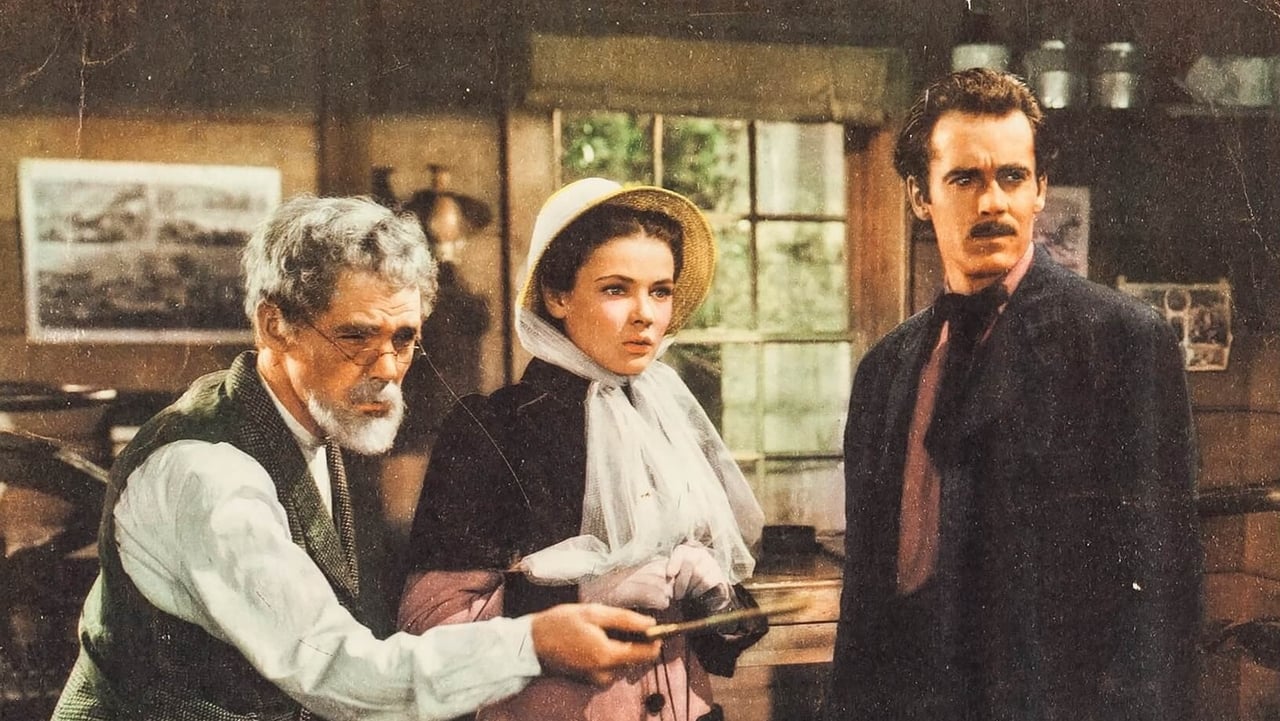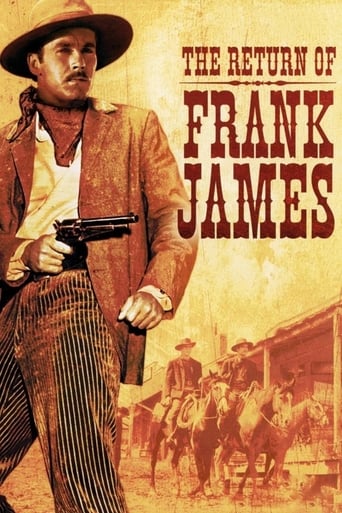Incannerax
What a waste of my time!!!
SparkMore
n my opinion it was a great movie with some interesting elements, even though having some plot holes and the ending probably was just too messy and crammed together, but still fun to watch and not your casual movie that is similar to all other ones.
Freeman
This film is so real. It treats its characters with so much care and sensitivity.
Sarita Rafferty
There are moments that feel comical, some horrific, and some downright inspiring but the tonal shifts hardly matter as the end results come to a film that's perfect for this time.
utgard14
Jesse James is murdered by Bob and Charlie Ford (John Carradine, Charles Hadden). At first, Jesse's brother Frank (Henry Fonda) is content to let the law handle things. But when the Governor steps in to pardon the Fords, Frank decides to take matters into his own hands.Sequel to Jesse James is wildly historically inaccurate. But I expected as much going into it so that didn't bother me really. It's directed by Fritz Lang but you wouldn't know it as the direction is pretty workmanlike. It's filmed in Technicolor, which is nice. Henry Fonda stars and is likable. Jackie Cooper plays his sidekick and he's just awful. John Carradine is great as usual. It's always nice to see Henry Hull and Donald Meek, as well. This is the film debut of beautiful Gene Tierney. She looks lovely as ever, especially in Technicolor. It's not a bad western but not a particularly unique one. It's the kind of picture I would imagine appealed more to kids in 1940 than their parents.
ferbs54
The sequel to the previous year's "Jesse James" (1939), "The Return of Frank James" is a perfectly entertaining, fast-moving Western that is historically important for two reasons: It was director Fritz Lang's first picture to be shot in color, and it served as the setting for the debut of one of Hollywood's most beloved actresses, Gene Tierney. In her 1979 autobiography "Self-Portrait," Gene tells us that Fox Studio head Darryl F. Zanuck had seen her performing on Broadway in 1940 in "The Male Animal," and immediately offered her a contract. After a previous stalled career in Hollywood, however, Gene--and her family--managed to finagle an unusually liberal deal from the studio chief: $750 a week, with a raise every six months, and the freedom to return to Broadway for half the year (an option that Gene never took advantage of), AND the right to make no changes to her hair or (soon-to-be-famous) teeth. In her first film for Fox, 20-year-old Gene played the role of Eleanor Stone, a liberated woman and nascent reporter on the Denver Star newspaper of 1882. She is duped by Frank James (Henry Fonda) and his sidekick Clem (Jackie Cooper, who had grown up a LOT since playing the role of kids a mere 10 years before, in films such as 1931's "The Champ") into writing a false story of the outlaw's demise, so that he might more easily track down the Ford brothers (John Carradine and Charles Tanner), who had just shot Jesse in the back and gotten away with it. Gene is excellent in her ingenue role, fresh faced and dewy eyed, and hardly deserving of Harvard Lampoon's "The Worst Female Discovery of 1940" citation.As for the rest of the film, it is nicely shot and filled with amusing characters and situations. Besides Fonda and Carradine, Donald Meek returns in this sequel (a bit tougher than usual, as the conniving railroad man McCoy), as does Henry Hull (almost stealing the show as Frank's buddy Major Rufus Cobb). The film contains surprisingly little action per se, although a horse chase through the Rockies and resultant gunfight, coming at the picture's midpoint, are very well executed. Fonda, who had worked with Lang before, in 1937's "You Only Live Once," is very fine here as Frank James: sympathetic, cool and tough; a reformed badman with a conscience, and perhaps only 1/100th as nasty as he would be 30 years or so later, playing another Frank, in Sergio Leone's "Once Upon a Time in the West." Tierney, apparently, absolutely adored working with Fonda, especially after he defended her against the director. As Tierney reveals in her book, she had the unfortunate habit of keeping her mouth slightly parted when she wasn't speaking (an adorable habit, sez me!), and Lang chastised her severely for it, yelling "You little bitch! When you have no lines, keep your mouth shut!" Little could Lang know that that mouth and those teeth would soon make Gene one of THE preeminent screen goddesses of the 1940s! Anyway, although "The Return of Frank James" has been faulted elsewhere for its many historical inaccuracies, it remains a fun enough diversion. Capped off by one of the most amusing trial scenes since The Three Stooges' "Disorder in the Court," the film is perfect for all ages, and most especially, of course, for fans of Miss Gene Tierney....
secondtake
The Return of Frank James (1940)The Western is back, as of 1939 when four big ones were released, including John Ford's "Stagecoach" with John Wayne, which has lasting critical acclaim, and also "Jesse James" which was the fourth largest moneymaker for that blockbuster year. Maybe it was the war breaking out in Europe, or just a realization that if you lifted a Western from its usual B-movie status the public would respond. Henry Fonda starred as Frank James in that one, and so this is really a sequel with the same chronology and feel as the first one. It is clearly A-list movie material with genuine Technicolor, a year after "Jesse James," "The Wizard of Oz," and "Gone with the Wind" had all made clear Technicolor was no passing gimmick.Frank James is now out to seek the killers of the more famous outlaw. The fact we are rooting for the renegade through his surviving brother is slightly odd--the anti-hero or negative stereotype as protagonist wasn't really respectable (or possible) until the 1960s, full fledged. Jesse James was a brave Civil War guerrilla fighter but he became an uncommonly violent criminal and murderer after the war. Frank James was probably as ruthless and bad (he was part of the same gang), but after the death of Jesse he escaped prison (in real life) and lived into the Twentieth Century.In this movie, Frank is not portrayed as a bad person. He just wants his brother's killers dead. And Henry Fonda is a kind of low key, determined fellow throughout. We naturally run into the standard assortment of types that are almost required in period Westerns--drunks and sheriffs and pretty girls out of place in this rough manly world. And there are shoot outs and a court trial and so on.Of all people to approach this genre, and in color, you'd least expect Fritz Lang, the recent émigré with "Metropolis" and "M" and "Fury" all in his portfolio. He gets rising star Henry Fonda in the loner lead for this sequel, naturally, and Fonda is the meat of it, really terrific (in an echo, actually, of the loner lead in John Ford's "Grapes of Wrath" in the same year). And then there's Gene Tierney playing a pseudo-reporter in her very first film role, showing early on that she is mostly a pretty face, but a decent actress at least. There are other great character actors (like John Carradine, fresh off of "Stagecoach" as well as "Jesse James") but specially notable (to me) is the African-American farm hand Ernest Whitman, who has to suffer from some awful stereotyping, but who is malleable and likable (and turns a verbal mistake into a catchy little song without a hitch).I love Lang's movies, even his weaker ones, and I really think he didn't quite "get" what a Western was about the way Ford did in the same period. It becomes something like a Hollywood drama that happens to be set in this post Civil War place west of the Mississippi. The stereotypes and archetypes are in play, but he misses the combination of grit and certitude that is part of the scene. Even Fonda comes across as slightly underplayed, a rather nice fellow who just happens to be out for blood. The photography is strong and vivid even though trapped to some extent on being "pretty" because of the rich color and beautiful scenery and by the bright lights so often used to blast the scenes for the tri-pack film. And then there is the ridiculous plasticity of the facts--most of what happens in the movie didn't happen at all in real life. Everyone is really just cashing in on the folk hero status of this killer, and on the success of "Jesse James" the movie the year before.
jc-osms
A mixed bag here, with some fine cinematography and lead acting by Henry Fonda, honing up his taciturnity for its zenith in "My Darling Clementine" let down by some poor supporting acting from Gene Tierney (too soft-soap bland), Henry Hull (so over the top you wonder if Bugs Bunny's animators adapted him as the prototype for Yosemite Sam) and Jackie Cooper, (too old and goshdarn winsome for his part as Jesse's adolescent son) and worst of all a stereotyping of negroes which would have put "Gone with the Wind" to shame - we even get the word "darky" jarringly shoved in our faces twice. That the plot veers so drastically from the truth also mars believability not to mention credibility. Maestro Lang seems to me let down by some poor second unit work - there are some poor horse-riding process shots and an awful "dummy death down a cliff" and yet the landscapes are on a par with Ford and Mann and the action scenes have zip. I believe this was Fritz Lang's first Western outing and I think it shows. I prefer his film - noir work where he could more employ his expressionistic genius but this colourful potboiler entertains enough.

